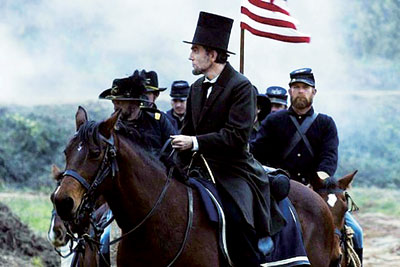|

Directed by Steven Spielberg, written by Tony Kushner and starring Daniel Day-Lewis as the 16th president of the United States, the film deals with the last four months of Lincoln’s life as he struggles to get the House of Representatives to pass the 13th Amendment* outlawing* slavery.
The problem is getting the votes.
To help make it happen, Secretary of State William Seward brings in a trio* of arm-twisters, the 1860s versions of today’s lobbyists*. This trio, played by John Hawkes, James Spader and Tim Blake Nelson, are as close to comic relief* as “Lincoln” gets.
Because the stakes are so high, and because he turns out to be a master strategist*, the president himself gets personally involved* in playing politics. He deals with key leaders like Preston Blair (Hal Holbrook), a conservative* Republican who is eager for peace talks with the South, and of course Jones’ Stevens, a hot-tempered abolitionist* who is just getting warmed up when he calls an enemy a “fatuous nincompoop*.”
One of the pleasant surprises of “Lincoln” is its portrait of the president as a man gifted at reconciling* irreconcilable points of view, someone who would play both ends against the middle and even stretch* the truth in the service of the greater good.
Kushner has said that he wrote “Lincoln” because, worried by today’s lack of faith* in governance, he wanted to tell a story that “shows that you can do miraculous*, beautiful things through the democratic* system.” It’s a lesson that couldn’t be more timely, or more dramatic.(SD-Agencies)
|

